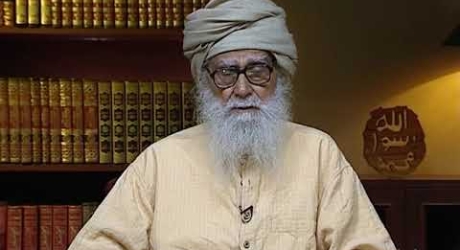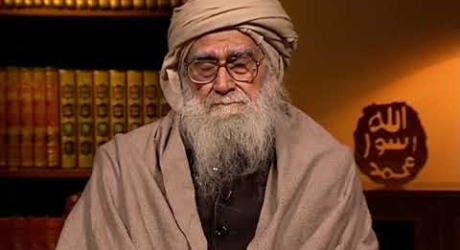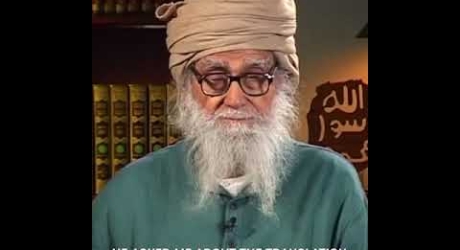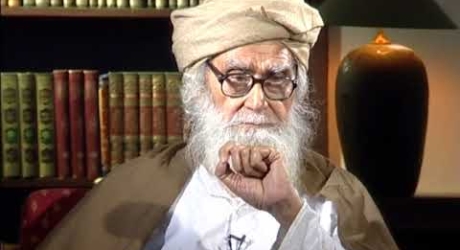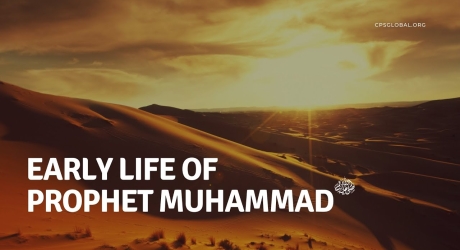The Quran says of the Prophet of Islam: “Surely you have a sublime character.” (The Quran, 68:4) Aisha, the Prophet’s wife, has provided the best commentary on this verse. Her words have been recorded in different books of hadith. Replying to a question on the character of the Prophet, Aisha, referring to this verse of the Quran, said: “His character was the Quran.” (Tafsir ibn Kathir, Vol. 8, p. 189) This shows that the most authentic picture of the Prophet of Islam is that which has been expressed in the holy scriptures. There is no doubt that the books of hadith and seerah provide an authentic source of information about the life of the Prophet. However, the Quran remains the primary source. Therefore, the picture of the Prophet, which tallies with the relevant statements made therein, must be regarded as correct. Therefore, here I propose to enlarge upon studying his life in the light of certain Quranic verses. The Quran describes the Prophet of Islam as a human being like any other. What distinguished him from others was not his being something other than human but, instead, his being a prophet and a human being. The following verses from the Quran illustrate this: ‘Holy is my Lord. I am but a human being sent as a messenger.’ (17:93) ‘I am only a human being like yourselves. It is revealed to me that your God is One God.’ (18:110) Their messengers replied, ‘We are indeed mortals like yourselves.’ (14: 11)
The life of the Prophet of Islam (or the seerat-e-rasool) is generally studied by making two broad divisions: the Meccan period and the Medinan period. But this division does not reveal the true nature of Prophet’s mission when actually it his mission that holds the real importance and not the place where he lived.
The mission of Prophet was only one, that is, dawat-ilalallah, or calling people to God. Prophet’s planning for dawah work was determined firstly by his ideology and secondly by the situation in which he found himself. Hence his mission was same but his method changed because of the changes in situation at
Meccan Period
When he received Prophethood in 610 AD, the initial verses of the Quran that were revealed asked the Prophet to:
“arise and give warning”(74:2)
That is, the Prophet was asked to disseminate the Creation Plan of God. With this in mind, Prophet used to go to places where men congregated (for example, the Kabah), where he addressed people thus,
‘O! People, say “There is no god but one God” and you will get salvation.’
(Seerat ibn Hisham)
For three years after attaining Prophethood, the Prophet did dawah quietly as the situation in
But the situation in
It was at in such times, that Prophet decided to migrate from
The decision to migrate did not come about suddenly. Foreseeing the worsening situation at
Considering greater opportunities for dawah in
Medinan Period
In his first sermon to people of
“O! People, save yourselves from fire, even if it be through a piece of date.”
(Al-Bukhari)
In this way, the Prophet started propagating the Creation Plan of God, by explaining that life is not meant to eat, drink, or to live for your family; it was rather to live in such a way that you become successful in the post-death period.
The Medinan period of Prophet’s life was therefore, just an extension of the dawah mission which had begun in the Meccan period.
The attacks by Quraysh
The Quraysh of
In Prophet’s lifetime war happened only thrice, each lasting for half a day. Hence in his 23 years of Prophethood, Prophet Muhammad was engaged in war for one and a half day. These were the wars of Badr, Hunayn and Uhud. Historians have written several books on the greatest wars fought in history. There said to have been 0,000 big wars that have been fought in history. But none of these big wars ranged for half a day, many spanned over years, decades and even centuries. Hence it is appropriate to call the wars in which Prophet of Islam got engaged as skirmishes. Prophet tried utmost to avoid these wars as he knew that dawah work is compromised in wartime and had the wars continued for long then dawah work would have halted.
But when inspite of this, the conditions remained hostile, the Prophet started thinking of way to ensure peace so that the dawah mission could be carried out unhindered.
Strategy adopted by Prophet Muhammad
The Prophet adopted a profound strategy of avoiding wars; he started negotiations for establishing peace with the hostile people.
A pertinent thing to highlight at this juncture is that these negotiations were solely for peace and not for regaining territory lost in
In the negotiations for peace, the Quraysh asked the Prophet to accept various conditions; the Prophet accepted all their conditions unilaterally only so that dawah could be carried on uninterrupted.
Why did the Prophet do so?
The following verse of the Quran was revealed after the signing of the No-War Pact between the Prophet and the Quraysh:
“Truly, we have granted you a clear victory.”(48:1)
In this No War Pact, the Prophet neither got back the territory lost in Mecca and also he had to unilaterally agree to the conditions of the other party, then why did the Quran call this pact a ‘clear victory’ for the Prophet? It was so because, this pact opened the “doors of dawah opportunities” before the Prophet and his Companions.
In God’s eyes gaining territory is not essential; it is opportunity for dawah that matters. This agreement opened all doors for dawah work. The lesson it gives is that even after losing everything, if we still have the opportunities to do dawah, then in God’s eyes, we clearly stand victorious. This was a revolutionary idea.
The only concern of the Prophet
This pact is a clear evidence of how opening up of dawah opportunities was of prime importance to Prophet Muhammad.
Even during a war, the Prophet gave emphasis to dawah rather than becoming victorious. For example, once a group was sent for defensive war under the leadership of Hazrat Ali. Before they departed, Prophet told Hazarat Ali,
“Even if one person receives guidance through you then it would be better than anything else in the entire world upon which the sun shines.”(Al-Bukhari)
The Prophet therefore time and again, reiterated the importance of bringing people on the path of truth; territory, war etc to him were secondary issues.
Here I am reminded of an interpretation by an Orientalist of what he thought was on Prophet Muhammad’s mind as he sat in a tent near the war ground and drew some lines on the sand. He interpreted this event as, “the leader of Islam was making his next war plans.” However, he did not consider what the Prophet did right after the war of Badr, that is, he negotiated for peace (Hudaybiyyah agreement) with the other party. Hence, the correct interpretation of the above event would be, “the Prophet of Islam was making his next peace plan.”
Post-Hudaybiyaah agreement
After the signing of the Hudaybiyyah agreement, the expansion of Islam happened rapidly. From being around 1,400 at the time of this pact, the number of companions of Prophet rose to 10,000 in two years’ time.
A general tendency after coming to such a position of power would be to plan to avenge those who opposed them. But what the Prophet of Islam did was quite different.
The Prophet did not take revenge from the people of
The Policy of Prophet
The Meccan leaders who had so direly opposed the Prophet in the beginning were instead of being killed, given complete freedom. The Prophet did not adopt the policy of revenge with these leaders. He announced:
“Everyone is free today. No on shall be caught.” (Seerat ibn Hisham)
This act of goodness on the part of Prophet Muhammad jolted the conscience of the Meccans so much so that they all embraced Islam. It is said for these men that it looked as if, “they had come out of their graves and embraced Islam.” This had happened because of the good conduct of the Prophet. Now they could no longer afford to stand against Islam.
Spreading the message
The Prophet did not follow the policy of obliterating the small tribes. Instead he sent out the message of peace to the various scattered tribes of
Inspite of now being in the position of strength, the Prophet did not give into dictating the terms of any peace agreement. For instance, the deputation of one tribe of Arab, Taif, posed several conditions before accepting Islam. They refused to abandon liquor and read the Namaz. But the Prophet accepted their conditions. This incident tells us of the Prophetic vision; the Prophet knew that these people would ultimately accept Islam and he therefore, allowed them to enter Islam with their conditions.
History tells us that people of this tribe actually accepted Islam completely and abandoned liquor and gave up the other conditions on which they were not ready to compromise in the beginning. According to a Hadith,
“God does not reward on being hard, what He rewards on being soft.” (Sahih Muslim)
Miracle of Peace
In a short time, the whole Arab was islamised without adoption of firmness or severity on the part of the Prophet. This was the miracle of peace.
The real focus of Islam is on dawah work. The prophetic model teaches us to make everything else secondary and to avail the dawah opportunities with foremost priority. Secondary here conveys the non-importance of that aspect to the extent that whether it is obtained or not, it does not become a cause of strife.
Some people called the Hudaybiyyah agreement a humiliating agreement. But the Prophet accepted even this humiliation at Hudaybiyyah for dawah work. Even if it amounted to removing the very word “Prophet” (which was his very identity) from the Agreement draft, he did that as well, just so that the opportunities of peace open up and dawah work takes place unhampered. This humiliation was not borne because the Agreement were to give Prophet access to some treasure or territory, it was done purely to create dawah opportunities.
The Last Sermon or the Hajj-at-ul-Widah
It is very important to note that at the time of Hajjat-ul-wida, the Prophet spoke only of dawah. He did not allow anybody to open the chapter of retrieving the property which they lost at the time of migration to
The only goal which the Prophet gave to his companions was to,
“Spread God’s message to the entire world.”(Seerat ibn Hisham)
Talking about any other issue or giving them any other goal would have served as a source of distraction in the dawah mission.
God did not give Prophet Muhammad a life spanning over thousands of years. He died a natural death and his mission then got transferred to his Ummah. The Quran says:
“So that the Messenger can bear witness about you, and so that you may bear witness about mankind.”(22:78)
Traditions have it that upon hearing the above words of the Prophet, the companions started their journey in the very direction which their horses faced. Therefore, the whole population of Sahabas got scattered in the world. The Sahabas planned their lives anew in the lands in which they migrated to do dawah; for them
Conclusion
The gist is that the differentiation of Prophet’s life between Meccan and Medinan period is merely a geographical division. The life of the Prophet was from A to Z, a dawah mission; he did dawah work throughout. Thus, the Prophet’s life cannot be divided into periods wherein he first did dawah, then engaged in wars (jung) and finally became a ruler (hukumat). The mission in both these periods was the same, that is, dawah work.
And now, it is the ummah (followers) of the Prophet of Islam that is required to do dawah throughout their lives.





